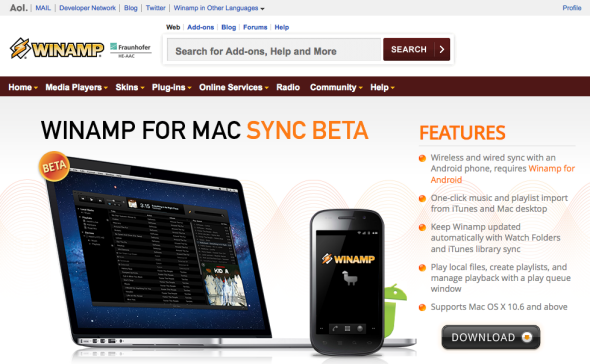I used to be distressed to learn Wednesday afternoon that AOL plans to close down its venerable music participant Winamp come Dec. 20. (In keeping with TechCrunch’s Frederic Lardinois, AOL plans to kill the Winamp web site and can cease offering updates and assist.) A lot of you’ll probably be shocked that this software program that, like Napster, you final fired up circa 2002 nonetheless exists in any type. However I took the information a lot tougher: I take advantage of Winamp every single day.
Whereas it’s true that Andrew Luck and I are the final two Individuals who nonetheless use flip telephones, I don’t use Winamp out of nostalgia or inertia—I really prefer it a lot, a lot better than iTunes. It’s resource-efficient, it’s customizable—chortle about “skins” all you need, however there’s one thing to be mentioned for placing design decisions within the palms of the top person—and it doesn’t make me really feel prefer it’s all the time making an attempt to get my bank card quantity. I’ve received a lot of digital music recordsdata, and I’ve organized them in a really private and fully unintuitive vogue. ITunes rejects my weird, free-associative taxonomy. Winamp handles it with aplomb.
I’m positive I’m not the one one who nonetheless makes use of Winamp, and I’m greater than slightly aggrieved that AOL seems to have given it the ax so casually. I don’t even want updates: Simply maintain the web site up in order that I can obtain one other copy if for some motive I ever want one. How a lot cash wouldn’t it have price AOL to maintain sustaining the Winamp web site? How a lot is AOL saving by shutting it down? The reply to each questions is not a lot in any respect.
There are different good, non-iTunes digital music gamers; AIMP is one among them. I’ll shift over ultimately, if want be, and I’m positive I’ll survive. My objection right here is extra of a conceptual one.
The shutdown of Winamp says quite a bit in regards to the tech world’s vicious utilitarianism and its readiness to mock or get rid of functions and providers which have fallen out of vast use. It’s the identical mindset that led Yahoo to take Geocities offline in 2009. Sure, Geocities was garish and largely deserted. However it was nonetheless an important a part of on-line historical past, a remnant of the clumsy, idiosyncratic Web that predated at the moment’s streamlined, circumscribed Net. And whereas it’s not an ideal analogue, Winamp is part of Web historical past, too. It was the primary MP3 participant for hundreds of thousands of individuals, and which means one thing. However to not AOL, I assume.



